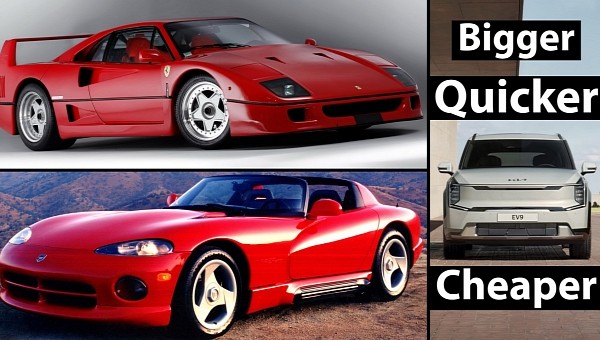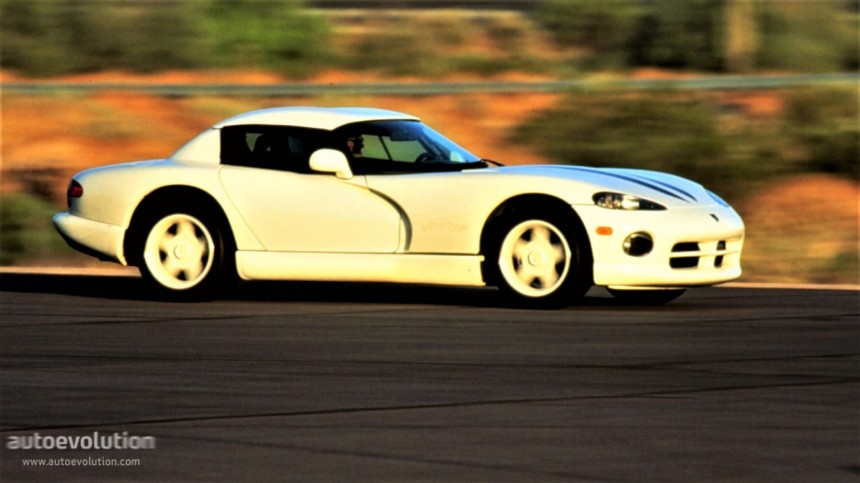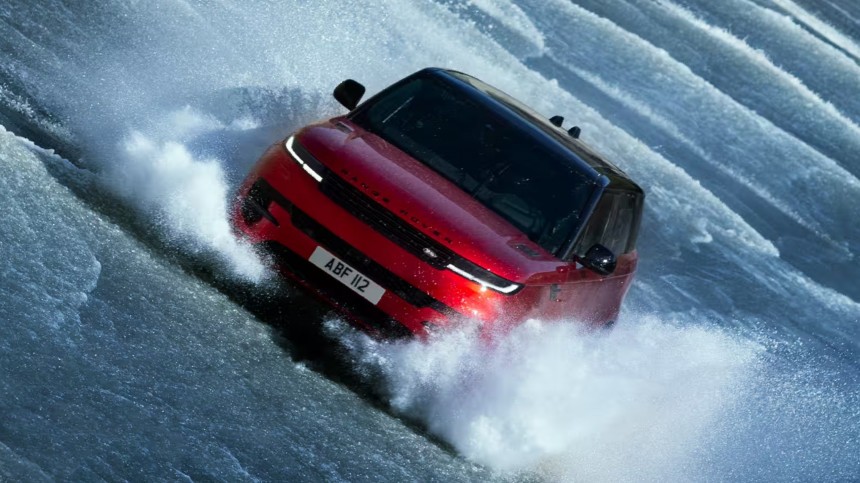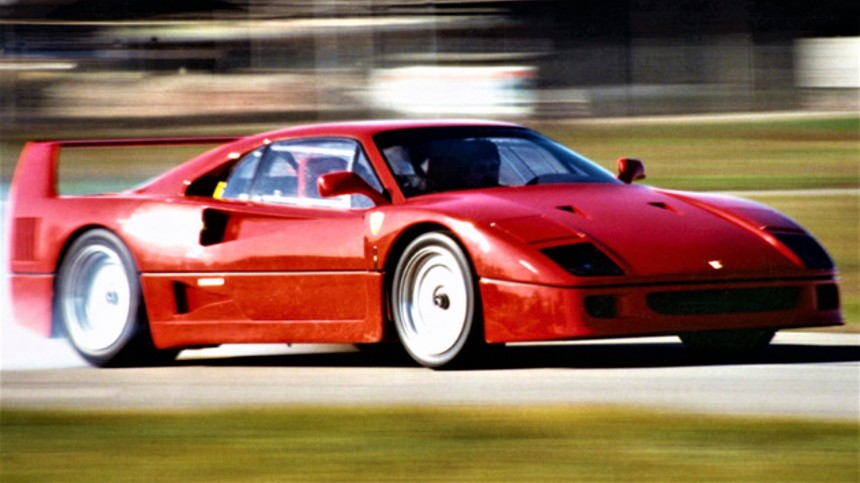Modern vehicles have come a long way in terms of performance, with even the most mundane models now becoming as fast as sports cars. Nowadays, even the most basic family SUVs perform well enough to put legendary supercars to shame – a reality that comes into focus when pitting them against each other in a straight line.
When you think of "supercar performance" from decades ago, the first thing that usually comes to mind is how fast they get off the line, something that wasn't always associated with regular, everyday cars like family sedans and SUVs. However, thanks to recent technological advancements, the power differences between aging supercars and so-called normal cars are no longer as big as they used to be. What was considered supercar level of acceleration back then is now more commonly seen in typical daily drivers ranging from practical SUVs to typical electric vehicles.
Take the Lamborghini Countach, for example. The Italian supercar's alluring aesthetics and screaming 12-cylinder engine alone easily made it the definitive dream car for many. Add its brisk 5.4-second 0 to 62 mph time into the mix you had something special... until electric vehicles came along, that is. Even a chunky modern electric SUV can give the sleeker Countach a run for its money performance-wise, and we're not necessarily talking about the brutish Tesla Model X Plaid.
Compared to the Countach, models like the Kia EV9 – a family SUV that seats seven people – is capable of similar, if not better, acceleration figures than an old supercar that seats only two. Meanwhile, the over 4,500 lbs 2022 Hyundai Ioniq 6 gets from nothing to 60 mph 0.3 seconds faster than a Countach, which weighs under 3,000 lbs. This performance gap isn't limited to just EVs, since new crossovers still utilizing internal combustion engines are just as good at outpacing racing legends that were, at one point, thought to be untouchable.
Almost two decades after the Countach's debut, came an American icon which graced posters and magazines in the 90s, featuring mean yet photogenic aesthetics and a thunderous 8.0-liter V10 engine. Yes, we're talking about the original Dodge Viper; featuring enough venomous bite to go along with its snarl, it's capable of getting from 0 to 62 mph in a mere 4.5 seconds. Similar results were also attained by the Chevrolet C4 Corvette ZR-1 – another automotive icon which used to be considered one of the fastest American cars ever made, back in the day.
Such performance figures might still be impressive by today's standards, but they're no longer reserved strictly for supercars. What was once extolled as a record-setting speed demon can now share a similar acceleration time to that of the V8-powered 2023 Range Rover Sport, which weighs upwards of 5,000 lbs. Meanwhile, the family-friendly BMW X5 plug-in hybrid can almost match the acceleration of old American supercars, while the X5 M variant is able to best that Mopar legend's time by 0.2 seconds.
Given the rising horsepower standards of modern vehicles, what you may deem as a “boring” commuter car would've been considered a supercar decades ago. In 2017, data from the U.S. Environmental Protection Agency revealed how the average power output of American automobiles went from 145 hp to as much as 283 hp in just four decades. Despite newer engines getting smaller, that didn't hinder non-sporty models from gaining more muscle. It's a combination that wouldn't have made much sense back then; a time when bigger usually translated to better and faster, while smaller only meant being more economical.
As engines became more efficient, gaining more horsepower became the new norm, resulting in powerful yet practical automobiles, in general. With features like traction control and forced induction systems becoming increasingly common in conventional vehicles, previously cutting-edge technology utilized by classic supercars started to look prosaic in comparison. To be fair, modern family cars like sedans, SUVs and pick-up trucks aren't likely to break any speed records any time soon, unlike their supercar ancestors. If it ever came down to it, however, they're more than capable of catching up with them in a straight line.
To put such significant performance discrepancies to the test, a Mercedes Benz E450 All Terrain – a midsize family car powered by a six-cylinder turbo engine – recently went up against a Ferrari F40 and its beastly twin-turbo V8 in a drag race. On paper, this match-up sounds like a one-sided beating, but it's a different story when it comes to reality. While the F40 besting a three-row hybrid station wagon was quite predictable, the race results were surprisingly close. If the F40 raced against an equivalent heavy wagon from its era, it would've left it in its dust rather effortlessly.
This time though, both the F40 and its driver evidently had to work harder only to end up eking out a close victory. Still, there's no denying that legendary supercars like the Ferrari F40 were undoubtedly ahead of their time. But now, it seems like time isn't the only thing passing these iconic automotive marvels by, as today's "boring" everyday cars are literally doing the same.
Take the Lamborghini Countach, for example. The Italian supercar's alluring aesthetics and screaming 12-cylinder engine alone easily made it the definitive dream car for many. Add its brisk 5.4-second 0 to 62 mph time into the mix you had something special... until electric vehicles came along, that is. Even a chunky modern electric SUV can give the sleeker Countach a run for its money performance-wise, and we're not necessarily talking about the brutish Tesla Model X Plaid.
Compared to the Countach, models like the Kia EV9 – a family SUV that seats seven people – is capable of similar, if not better, acceleration figures than an old supercar that seats only two. Meanwhile, the over 4,500 lbs 2022 Hyundai Ioniq 6 gets from nothing to 60 mph 0.3 seconds faster than a Countach, which weighs under 3,000 lbs. This performance gap isn't limited to just EVs, since new crossovers still utilizing internal combustion engines are just as good at outpacing racing legends that were, at one point, thought to be untouchable.
It's a losing race against time
Such performance figures might still be impressive by today's standards, but they're no longer reserved strictly for supercars. What was once extolled as a record-setting speed demon can now share a similar acceleration time to that of the V8-powered 2023 Range Rover Sport, which weighs upwards of 5,000 lbs. Meanwhile, the family-friendly BMW X5 plug-in hybrid can almost match the acceleration of old American supercars, while the X5 M variant is able to best that Mopar legend's time by 0.2 seconds.
Normal cars went from boring to soaring
As engines became more efficient, gaining more horsepower became the new norm, resulting in powerful yet practical automobiles, in general. With features like traction control and forced induction systems becoming increasingly common in conventional vehicles, previously cutting-edge technology utilized by classic supercars started to look prosaic in comparison. To be fair, modern family cars like sedans, SUVs and pick-up trucks aren't likely to break any speed records any time soon, unlike their supercar ancestors. If it ever came down to it, however, they're more than capable of catching up with them in a straight line.
This time though, both the F40 and its driver evidently had to work harder only to end up eking out a close victory. Still, there's no denying that legendary supercars like the Ferrari F40 were undoubtedly ahead of their time. But now, it seems like time isn't the only thing passing these iconic automotive marvels by, as today's "boring" everyday cars are literally doing the same.













